What Your Poop Tells You About Your Gut Health
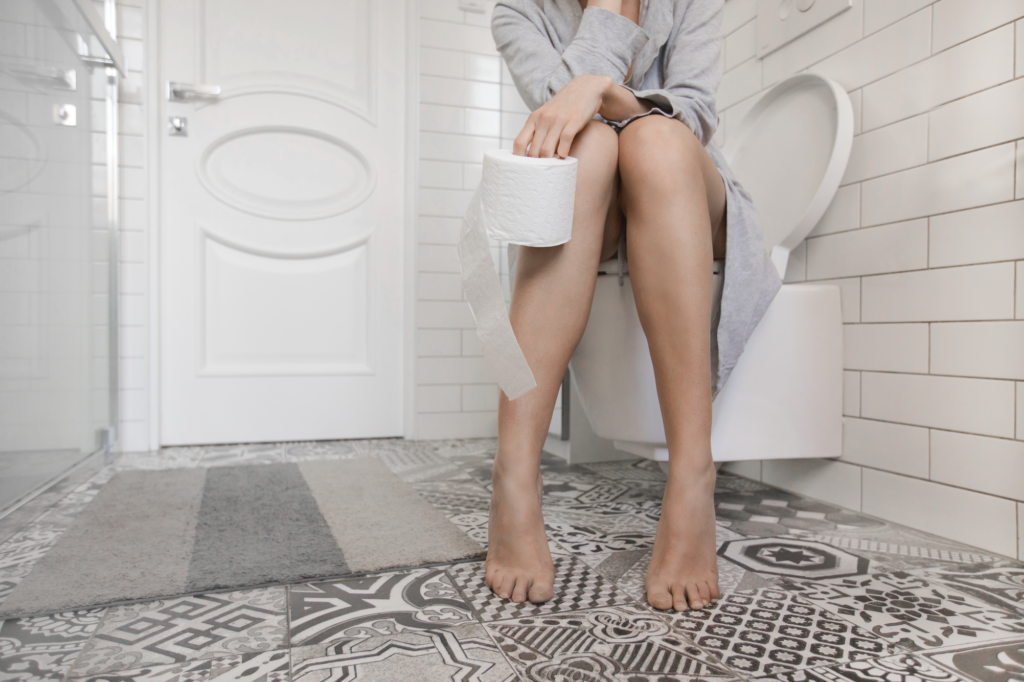
POOP. The one thing that everyone does, but no one wants to talk about. Totally understandable, it’s TMI. It’s probably only appropriate to talk about your pooping habits with your doctor. And even then, it is supremely uncomfortable.
But did you know that your poop actually gives you a good glimpse into your gut health? Which, in turn, can tell you a lot about your overall health.
It’s true!
How you go, how frequently you go, how long it takes for you to go, how it looks. These are all the things that can say a lot about what is happening in your gut. And, as I discussed in detail in a previous post, the health of your gut microbiota decides your overall health.
That is because the bulk of your poop is actually bacteria from your gut microbiota. And those tiny gut bugs can influence how, when, and what you poop.
How do you know what your gut bacteria are saying, you ask? Well, read on to find out!
Your Poop is a Window into Your Gut Health
Your poop gives you signs about your gut health in the form of those tiny microbes from your gut microbiota. And oddly, those evicted gut bugs in your poop might just hold the answers to some of your most frustrating health conundrums.
Recent estimates from a study suggest that 4 million North American adults experience frequent bouts of constipation. Additionally, it was found that about 15% of these adults suffer from Irritable Bowel Syndrome (IBS).
So, if you’re not having frequent healthy poops, it might be your gut microbiota sending you a message that something may be wrong inside your body. You just have to learn how to decode the message.
Everyone Poops Differently
Now, of course, people of different ages, genders, and with different lifestyles all have varying pooping habits. And your poop may be vastly different today than it was yesterday and even from what it can be tomorrow. That is because there are many factors that can influence how you poop. Factors such as what you are eating, how much water you are drinking, how much exercise you are getting, what medications you are on, and how much stress you are under. All of these things can change the colour, consistency, odour, and regularity of your bowel movements.
Essentially, your poop is an indication for how well your current dietary and lifestyle choices are working for your body and your overall health. And when those things are not working well for you, you find out by way of digestive issues.
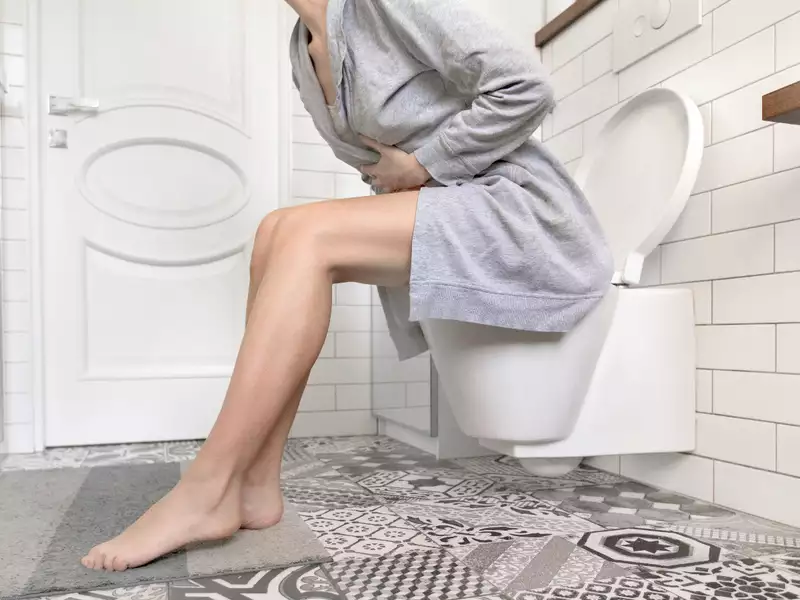
Image may be subject to copyright.
But here’s the kicker, most people are not even aware of their gut problems. Even more alarming is many people think their irregular bowel movements and discomfort are normal. In actuality, these symptoms stem from their gut microbiota’s efforts to sound the alarm to change their dietary and lifestyle habits.
What is in Your Poop?
Most people think of poop as simply the leftover remains of the food that you ate. The stuff that doesn’t get used and makes its way through after digestion. And it is some of that, about 25%.
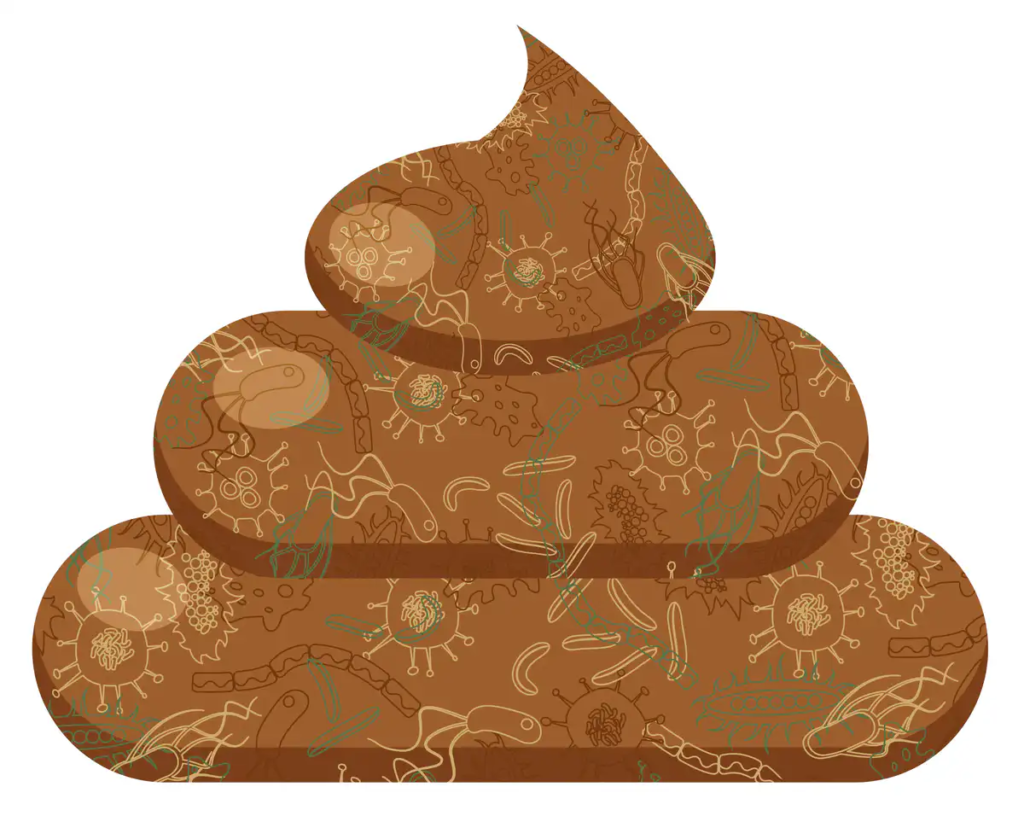
In reality, however, your poop is made up of mostly water. And the remaining about 25 to 54% is bacteria that were previously renting space in your gut microbiota. That’s nearly 100 billion bacteria per gram of stool. Most of which (about 50%), by the way, are still alive. But some are dead – essentially, bacteria carcasses that fed on the indigestible plants that you ate and died shortly afterwards.
The different types of bacteria in your poop can influence how hard or loose it is. For example, Prevotella bacteria is typically found in your mouth, vagina, and gut. When Provotella bacteria are found in your stool, it is an indication that you are eating a healthy high fibre diet. And thus, your poop will be nice and soft and easy to pass.
On the other hand, if Ruminococcaceae bacteria are found in your poop, it suggests a diet higher in carbohydrates. Mainly because these bacteria are responsible from breaking down carbs. As a result, Ruminococcaceae in your poop typically results in harder stools.
What Those Gut Microbes in Your Poop Are Telling You?
As it happens, the microbial community in your poop is incredibly complex. But more, knowing the types of microbes in your poop can be especially informative as to what is in your gut microbiota.
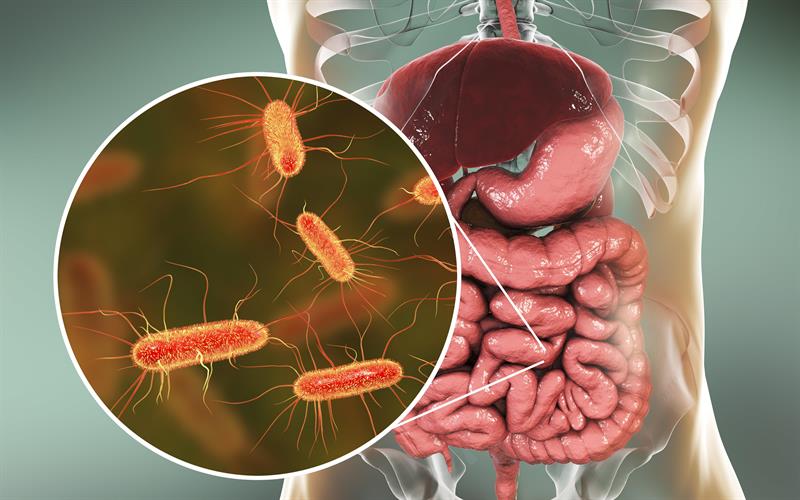
Image may be subject to copyright.
As I previously discussed in my microbiome post here, there are health consequences when the microbial community in your gut is disturbed.
We now have strong evidence linking the gut microbiota to certain diseases. These include inflammatory bowel disease, obesity, liver disease, heart disease, and surprisingly, even depression. And more recently, Parkinson’s disease.
Beyond that, these disease states can lead to changes in the type of bacteria in your gut. The result is raised inflammatory proteins. Which by extension, those bacteria and proteins will be present in your stool. And as I mentioned, the type of bacteria in your gut influences the frequency, consistency, smell, and ease or difficulty of your poops.
So, what is a normal healthy Poop?
Though pleasant it may not be, but check out the toilet bowl the next time you go No. 2. Because here’s the quick and short answer to this complex question:
You should be pooping regularly. At least once per day. Your poop should be easy to pass – not little hard rocks. But also, not a muddy puddle either. Taking too long and/or straining to push are not normal. It should sink – occasional floaters are fine, but not ideal. A slight foul odour is normal. But deadly stink bombs are not. A light yellowish to medium brown colour is ideal. But greyish black is not good. Going too often (more than 3 times per day) is not great. And not going often enough (less than 3 times per week) is also not normal. Most importantly, never any blood.
It’s that simple. But also, very complicated.
The image below is called the Bristol Stool Chart. It gives you a good visual of what a “normal” poop should look like. It also gives a good description of what “normal” poop consistency should be. Aim to see Type 3 and Type 4 in your toilet bowl the next time you poop.
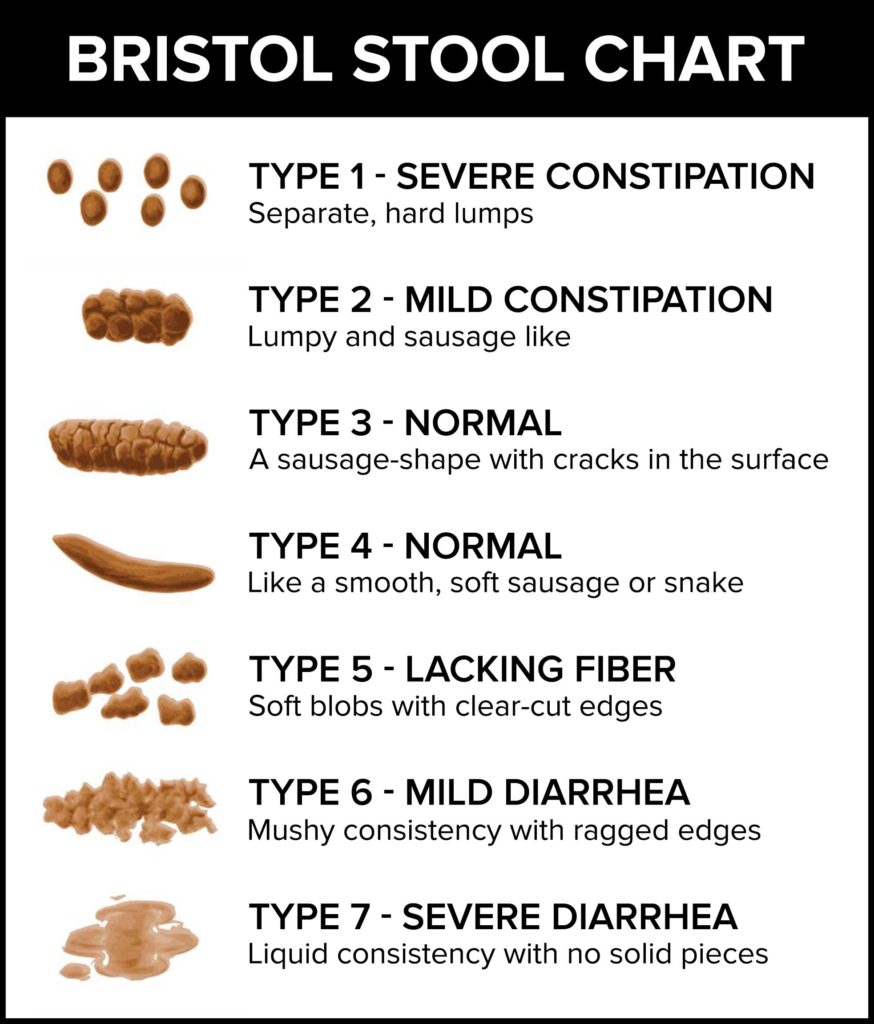
How Often Should You Poop?
The short answer: you should be pooping at least once per day.
But if you ask your physician, however, many would say, “anywhere between once per day to 3 times per week is normal”. Technically, that is not wrong. But it is not normal.
Let me put this into context. Recent research has shown that about 60% of North American adults live with a chronic disease. And up to 40% suffer from two or more chronic diseases. And those statistics are growing. Meaning, the average majority suffer from chronic illness. But it is not normal to be living with chronic disease.
Same thing with your pooping habits. Reluctantly, yes. Three bowel movements per week might be statistically “normal” for the average majority. But so is chronic disease.
Simply put, just because pooping 3 times per week is what the average person is doing does not mean it is normal or even healthy. It is actually abnormal and unhealthy not to be pooping at least once a day.
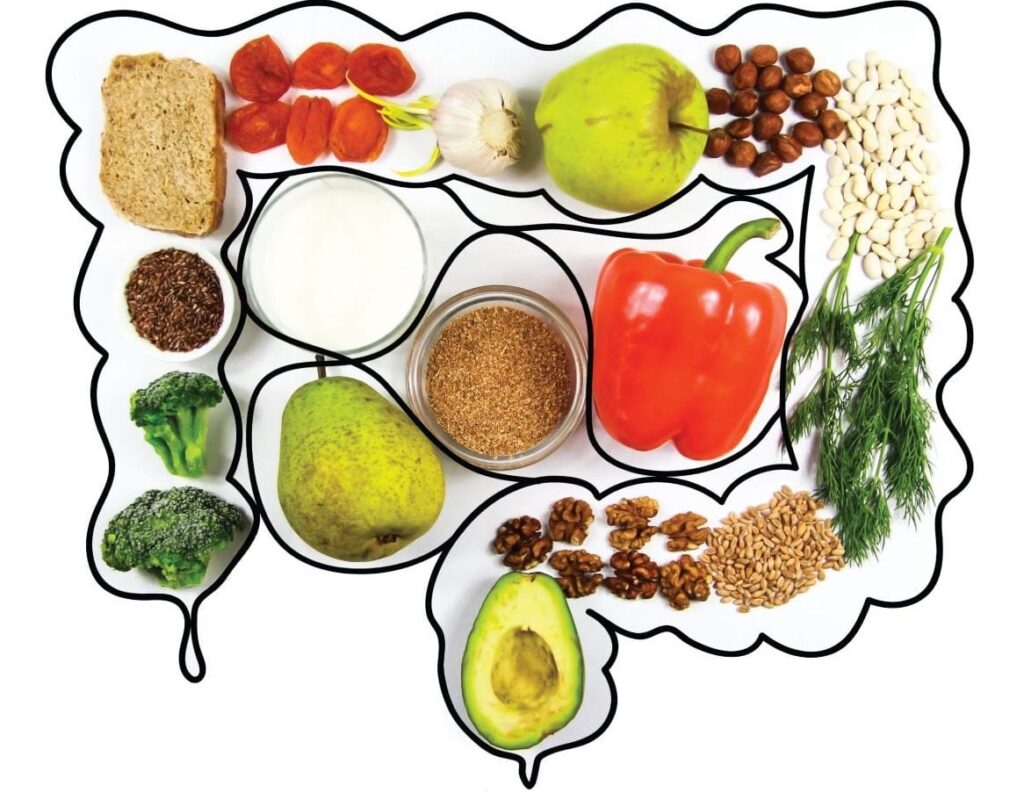
Also, here’s the math. When you eat an apple, for example, it can take about 1 to 4 hours to pass through your stomach. Then 4 to 8 hours for your small intestines to do its thing. And lastly, about 12 to 25 hours for your large intestine to digest the rest and form your poop. This is known as your gut transit time. It is the time it takes for food to travel from your mouth, get digested, and out of your body. In total, your gut transit time is roughly 17 to 37 hours (~1.5 days) for that one apple.
Here’s the twist, we all eat more than once a day. In fact, most people are eating every 3 to 5 hours. And we didn’t just start eating yesterday. So, we all have back up reserves of food inside our gut being digested continuously. Which is why you should be pooping every single day to get rid of the previous days’ waste.
In fact, there are some clinical implications that suggest pooping at least once per day is not only reasonable, but actually, expected to remain healthy. That is because pooping frequency is a simple and effective indicator of how well your gut is functioning. And studies have shown that suboptimal functioning of your gut may contribute to various diseases. Diseases such as Crohn’s disease, irritable bowel disease, obesity, diabetes, and heart disease. The list goes on.
More recently, there have been studies showing a strong link between infrequent bowel movements (less than 3 times per week) and Parkinson’s Disease.
Bottom line is, you should be needing to poop at least once a day. Just because the average majority may be pooping 3 times per week, it is not normal nor healthy.
How to Improve Your Poops?
The good news is, aside from any underlying health conditions, there are ways to have glorious poops and improve your gut health (which I discussed in detail here). Here’s how:

- Drink more water. Most people don’t drink enough. Aim for about 2 litres or half a gallon a day. If you’re active and sweating a lot, drink more. But in general, follow the ‘8×8 rule’, which is, drink eight 8-ounce glasses per day to stay hydrated and help things move along smoothly.
- Eat more fibre-rich foods. I talked about this in detail in my previous gut microbiome post. To sum it up, the single greatest way to achieve a good balanced gut health and help you poop regularly is eating lots of fibre from a wide diversity of plants. Aim to eat about 25 to 30 grams of fibre from fruits and vegetables every single day.
- Exercise regularly. Move your body until you are lightly sweating and breathing heavily for at least 30 minutes 3 times per week. Move, breathe, sweat, and play. This will help your gut move things along smoothly as well.
- Stress less. Being stressed can make you feel slow and lethargic. But importantly, it also slows down your gut. Find ways to destress and relax, like journaling, yoga, singing, or spending time with friends and family. Do what you need to do to rejuvenate yourself.
- Get better sleep. For new moms, this is laughable, I know. But studies have shown a strong link between poor sleep and poor gut health. So, maybe you may not be able to get a full 7 to 9 hours of sleep per night. But what you can get, make sure it is good quality deep sleep.

6. Use a Squatty Potty. I know this sounds odd, but the position of your body while you poop can make things easier. Sitting creates what is called an anorectal angle. It essentially puts a kink in the bottom half of your rectum. This, in turn, creates upward pressure making it harder to poop. So, getting your knees up with a stool (no pun intended) or a Squatty Potty removes the kink to allow things to flow more naturally.
Of course, if you are pooping less than 3 times per week or your digestive issues persist beyond a week, consult with your doctor for a diagnosis of your symptoms.
The Blue Poop Challenge

If you want to find out more about what your poop is telling you, try the Blue Poop Challenge. Yes, it sounds strange, but it’s actually quite fun! And also, informative.
Basically, the Blue Poop Challenge is gut health campaign to raise awareness and study gut health using your gut transit time. The challenge is based on a study called PREDICT that was published in Gut.
How it works is you simply bake muffins that contains plenty of blue dye. The recipe can be found on ZOE’s website. Then, you eat two muffins and track how long it takes until you see blue in your toilet bowl. After, you answer a few questions about your overall health on ZOE’s site. From there, you’ll get a ‘poop profile’ that contains a bunch of information about what your gut transit time tells you about your gut health.
Based on the study, if you have a shorter gut transit time, meaning your blue poop came quickly, then you’re more likely to be in better gut health. So, essentially, the faster your body moves the blue dye through your gut, the healthier your gut microbiota may be.
Keep in mind, though, there are other factors (frequency, consistency, smell, and shape) to consider that determines your overall gut health. So it’s not just about your blue poop time. But your blue poop time can give you a glimpse into what your poop is telling you.
The Bottom Line
Waking up every morning with poop on your mind is not a bad thing. In fact, it is a healthy gut thing. Because regularly pooping in the morning starts your day off healthy, happy, and even a whole load lighter!
Everyone’s pooping habits change every day. There are no poops that are ever exactly the same. But when changes last longer than a week, there may be some cause for concern. Because your poop is very informative and it is your body’s way of telling you something is off.
On the other hand, if you’re occasionally experiencing bouts of gas, bloating, discomfort, try changing your diet and lifestyle habits. And if you’re more curious, take the Blue Poop Challenge to see what your gut transit time is saying about your gut health!






[…] Women also have more guts than men – literally! The lower part of the colon is longer in women than in men. Women also have more stuff crammed into their lower abdomen – between their digestive tract and their reproductive organs, there is less room for things to expand. This may help explain why women tend to experience more digestive distress than men. Learn more about your gut health in my gut microbiome post here and what your poop tells you about your gut health here! […]